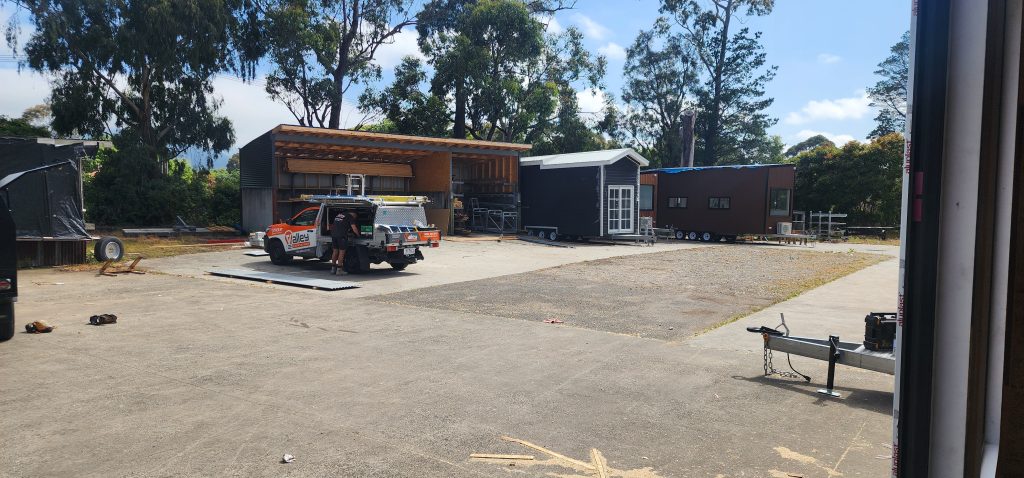-
Australia
Copyright © 2025 Powered by BCI Media Group Pty Ltd
Confirm Submission
Are you sure want to adding all Products to your Library?
Contact Detail

Sustainability has become a central consideration of construction. The world is moving towards eco-friendly practices, aiming to meet zero carbon deadlines, and the Australian industry has put it at the top of the agenda. The National Construction Code (NCC) now mandates that new homes reach a 7 Star NatHERS Rating plus a Whole-of-Home rating.
Modular homes are emerging as a key player in sustainable construction. The construction process itself can be more sustainable, while builders, architects and property developers are also recognising that eco-friendly materials such as Thermotek uPVC windows can amplify sustainability, contributing to energy efficiency and lowering the overall carbon footprint of a property or development.
What Are Modular Homes?
Modular homes are prefabricated constructions, built off-site. They can be designed to be energy-efficient, cost-effective, and environmentally friendly.
Constructed in controlled factory settings, they allow for precise measurements and efficient use of materials, resulting in less waste. These homes are then transported to the final build site, where they are quickly assembled, reducing construction time and minimising the environmental impact of traditional building processes. This controlled approach to construction is a key reason why modular homes are leading the charge in sustainability.
Understanding Modular Homes: A Sustainable Building Solution
Let’s take a deeper dive into the key environmental benefits of Modular Homes.
1. Reduced Waste
On a typical build site, materials often need to be over-ordered due to potential miscalculations, damage, or unexpected issues. This results in significant amounts of construction waste, much of which ends up in landfills.
Modular homes, on the other hand, are built in factories where precise measurements and efficient production techniques dramatically reduce waste. With better control over material use, modular construction can reduce waste by up to 50%, making it a much more sustainable option when compared to conventional methods.
Moreover, offcuts and surplus materials are easier to recycle in a factory setting, contributing further to the sustainability of modular homes.
2. Energy Efficiency
Energy efficiency and lowering the carbon footprint of a property is a fundamental consideration for builders, architects and property developers, as it is essential to reach a 7 Star NatHERS rating and stay compliant.
Sustainable modular homes can be built with energy-efficient materials and technologies that reduce energy consumption, making them more sustainable over their lifetime. An example is installing advanced window and door systems such as Thermotek uPVC windows.
Thermotek uPVC Windows such as our Boutique Series offer both style and superior thermal insulation, significantly reducing the amount of heat that escapes during the winter and preventing excess heat from entering in the summer. They are also designed to ensure an airtight seal against air, wind, and rain.
Airtight construction is pivotal for energy efficiency. We meticulously seal all joints, openings, and penetrations in the building envelope. We use high-quality sealing materials and techniques around windows, doors, and other potential leakage points.
The innovative locking mechanisms and high-quality sealing materials used in Thermotek products contribute to the overall airtightness, preventing drafts and energy loss. This airtight construction is essential for reducing the reliance on heating and cooling systems, thus enhancing energy efficiency. This provides both environmental and financial benefits to homeowners.
Additionally, many modular homes incorporate renewable energy solutions like solar panels or geothermal systems. This integration of energy-efficient technologies helps further reduce the operational carbon footprint of the home.
3. Construction Speed & Efficiency
Modular homes are not only more sustainable in their construction but are also quicker to build, reducing the overall environmental impact of the construction process. Traditional homes can take months to build, consuming significant amounts of energy in the process. In contrast, modular homes can be completed in a fraction of the time—often in weeks—thanks to being built offsite.
This helps reduce emissions from construction vehicles and equipment, and they require fewer energy resources to complete the build. This lowers the overall carbon footprint of the industry.

4. Selection of Sustainable Materials
Modular Homes can also amplify sustainability by selecting sustainable materials. Thermotek window and door systems harness uPVC and are a prime example of how thoughtful material choice can enhance sustainability.
uPVC, or unplasticised PVC, is a more sustainable alternative to traditional PVC. The latter contains ethylene, a by-product of oil that contributes to greenhouse gas emissions. Unlike conventional PVC, uPVC doesn’t require chemical plasticisers, making it more eco-friendly. It’s composed of strong modifiers and fillers, resulting in a durable and low-maintenance material, ideal for windows and doors in modular homes.
At the end of their lifecycle, Thermotek uPVC Windows can be recycled, helping to reduce waste and support a circular economy. Recycling uPVC uses significantly less energy than producing new materials, further reducing the overall embodied carbon in construction. By choosing recyclable materials, modular homes can amplify long-term sustainability for builders, architects and property developers.
Thermotek uPVC windows reduce heat transfer between the inside and outside of the home, helping to maintain a comfortable indoor temperature without over-relying on heating and cooling systems. This translates into lower energy consumption and significant savings on energy bills, making it easier for homeowners to be sustainable without sacrificing comfort.
5. Double and Triple Glazing for Enhanced Energy Efficiency
Modular homes can prioritise energy efficiency by installing advanced window options featuring double or triple glazing. These windows consist of either two or three layers of glass separated by air or gas-filled spaces, creating an effective insulating barrier that significantly reduces heat transfer.
This superior glazing technology enhances the overall energy performance of the home, leading to lower energy bills and increased indoor comfort. It also helps in meeting the stringent energy compliance standards of the National Construction Code.
Thermotek windows can be equipped with Low-E (low emissivity) coatings. This feature further improves thermal efficiency by reflecting heat back into the interior during colder months and blocking unwanted heat during warmer seasons, ensuring a comfortable living environment throughout the year.
6. Durability Means Low Maintenance
Durability is a crucial factor when it comes to sustainability. A product that lasts longer and requires less maintenance is ultimately better for the environment, as it reduces the need for frequent replacements.
Thermotek uPVC Windows are highly resistant to weathering and corrosion, making them a long-lasting choice for modular homes. This is true also for our Smart Slide window and door systems, which can be installed in modular homes to create a beautiful indoor-outdoor flow and open up a space.
This durability means fewer replacements over time, contributing to less waste and further supporting sustainable construction practices.
7. Modular Homes Can Harness Passive Design
Another way modular homes contribute to sustainability is through passive design techniques. These homes are often designed to make the most of natural light and ventilation, reducing the need for artificial lighting and climate control. Strategically placed windows and using sliding door systems for open-plan layouts allows for better airflow and natural heating, which cuts down on energy consumption.
By combining passive design strategies with energy-efficient materials like Thermotek uPVC Windows, modular homes can achieve higher levels of energy efficiency, further reducing their environmental impact.
Choose Thermotek High-Performance Windows for Sustainable Modular Homes in Australia
In Australian urban areas, such as Sydney and Melbourne, modular homes are becoming popular not only for their affordability but also for their minimal environmental impact. Equipped with energy-efficient technologies, such as Thermotek uPVC Windows and solar panels, these homes are setting new standards for sustainable living in Australia.
Modular homes are also proving to be a flexible solution for various climates. Whether in the cooler southern regions or the warmer northern parts of the country, these homes can be adapted to local environmental conditions, making them a versatile and sustainable housing option for a wide range of communities across Australia.
As the demand for sustainable living continues to grow, modular homes are likely to become more widely adapted by builders, architects and property developers.
Their ability to reduce waste, improve energy efficiency, and incorporate eco-friendly materials like Thermotek uPVC Windows makes them a perfect fit for a world increasingly focused on lowering carbon emissions and preserving natural resources.
If you’re looking for sustainable window systems for your modular homes, talk to the dedicated team at Thermotek today.



